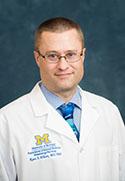Biography
I am a native Michigander, but completed MSTP (MD/PhD) training (PhD in Immunology; mentor: Lieping Chen), residency (Internal Medicine), and fellowship (clinical-scientist track, Hematology & Medical Oncology) training at the Mayo Clinic (Rochester, MN) before joining the faculty (physician-scientist, Division of Hematology/Oncology) here in 2011.
Research Interests
The T-cell lymphoproliferative disorders are a heterogeneous and poorly understood group of non-Hodgkin lymphomas which remain an unmet medical need, as the most common T-cell lymphoma in the United States includes a heterogeneous mix of lymphomas that lack distinguishing characteristics and, until recently, remained clinically, molecularly, and genetically "unspecified". Unfortunately, most patients afflicted with these aggressive lymphomas will ultimately succumb to their disease. Improved understanding of T-cell lymphoma pathogenesis and the development of novel therapeutic strategies will be needed to address this challenge and improve outcomes for patients afflicted with these aggressive lymphomas. My group discovered that malignant T cells, much like conventional T cells, remain dependent upon myeloid-derived antigen-presenting cells (APC’s), including lymphoma-associated macrophages (LAM). Within the tumor microenvironment, APC’s/LAM engage the antigen (“signal 1”), costimulatory (“signal 2”), and cytokine (“signal 3”) receptors expressed by malignant T cells, promoting their growth, survival, and resistance to both conventional chemotherapeutic and immunotherapeutic strategies. My group also made the landmark discovery that the most common T-cell lymphoma in North America is comprised of two molecularly and clinically distinct subsets, one of which expresses the T-cell transcription factor GATA-3 and is characterized by a GATA-3 dependent transcriptional program that, among other things, confers resistance to chemotherapy in both a cell-autonomous and non-cell-autonomous manner. This landmark discovery has since been independently validated, and is reflected in the 2016 WHO classification of these lymphomas. My laboratory also seeks to identify novel therapeutic targets in T-cell lymphoproliferative disorders using complementary mouse models and primary T-cell lymphoma specimens (in ex vivo and patient-derived xenograft studies). I am currently the principal investigator on multiple investigator-initiated clinical trials that are directly linked to work that has been completed or is ongoing in my laboratory. Consequently, we are poised to clinically translate our future laboratory-based findings into novel therapeutic strategies that we hope will improve outcomes for patients afflicted with T-cell derived lymphoproliferative disorders. I enjoy working with a multidisciplinary team of enthusiastic collaborators who share this common goal.
Research Opportunities for Rotating Students
- Investigating the role of p300-dependent GATA-3 acetylation in regulating GATA-3 function in T-cell lymphomas.
- The role of lymphoma-associated macrophages in a murine T-cell lymphoma model.

